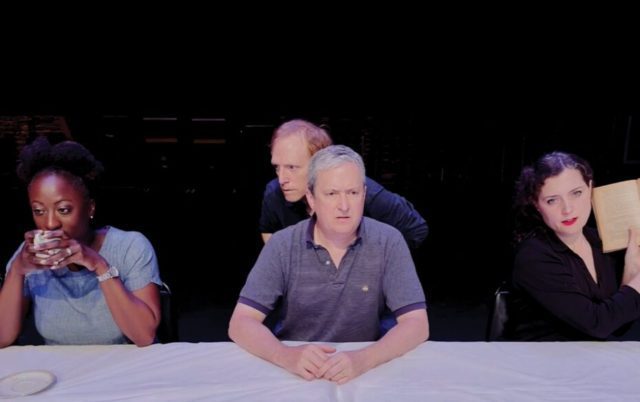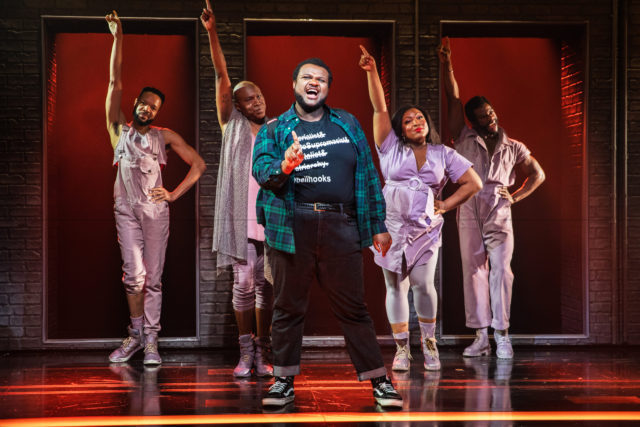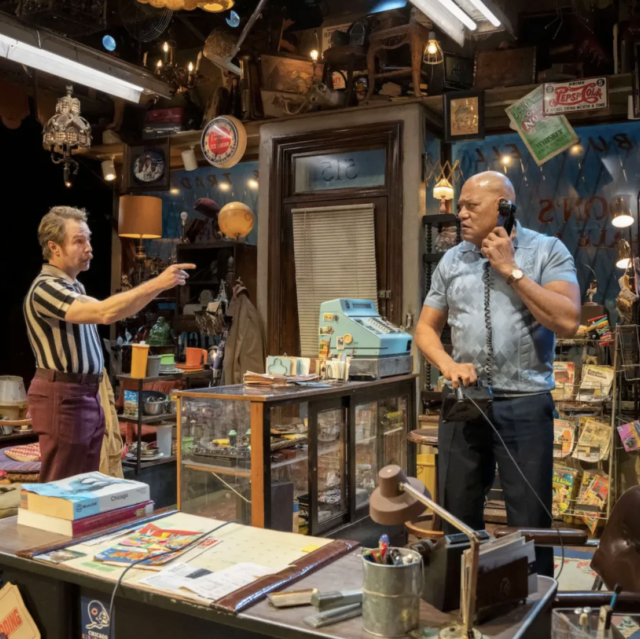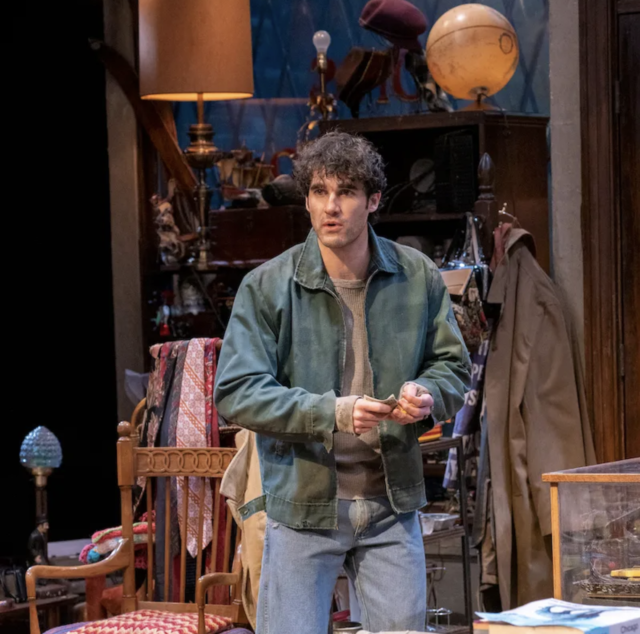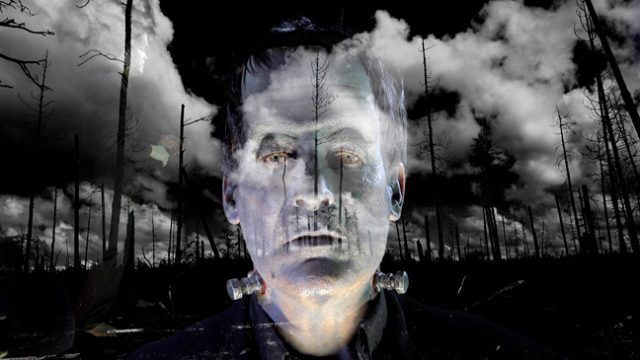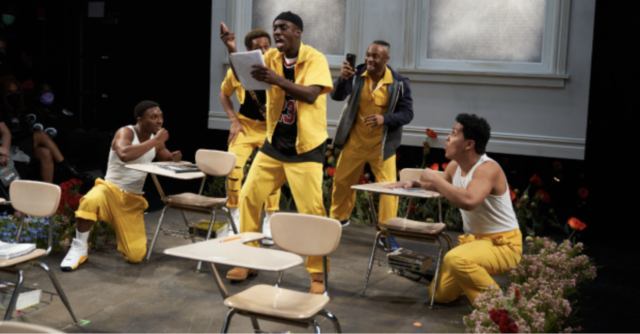
Donja R. Love’s soft takes place in a juvenile correction center (photo © Daniel J. Vasquez)
soft
Susan & Ronald Frankel Theater, the Robert W. Wilson MCC Theater Space
511 West 52nd St. between Tenth & Eleventh Aves.
Tuesday – Sunday through July 17, $39-$68
mcctheater.org/tix/soft
As Donja R. Love’s gorgeous, hard-hitting soft began, I couldn’t help but notice that the crowd at MCC’s Susan & Ronald Frankel Theater was about eighty percent Black and brown, which thrilled me, a white cis male. For the last ten years, I have been closely observing the racial makeup of New York City audiences, particularly as the breakthrough success of so many Black and brown playwrights and directors is helping theater become more diverse. In such works as David Harris’s Tambo & Bones, Jordan E. Cooper’s Ain’t No Mo’, and Jackie Sibblies Drury’s Pulitzer Prize–winning Fairview, the fourth wall gets shattered as the characters acknowledge and confront, in serious and/or comic ways, what is most often a significantly majority white audience.
Love’s play transpires over the course of a semester in a classroom in a correctional center for juveniles, offering them the opportunity to excel in schoolwork and avoid going to prison. Mr. Isaiah (Biko Eisen-Martin) is the caring teacher, determined to help his students thrive. Antoine (Dharon Jones), Dee (Essence Lotus), Bashir (Travis Raeburn), Kevin (Shakur Tolliver), Jamal (Dario Vazquez), and Eddie (Ed Ventura) are realistic Black, Afro-Latino, and Dominican teenagers dealing with drug and alcohol abuse, homophobia, poverty, systemic racism, and other societal ills. Mr. Cartwright (Leon Addison Brown) is the no-nonsense superintendent who advises Mr. Isaiah not to get too involved with the kids.
Mr. Isaiah is returning their papers on Othello, noting that several students are improving by being tutored by Kevin. Antoine gets lost in his drawings — “I’m Picasso out this bitch,” he tells Mr. Isaiah — while Eddie sleeps in the back and Bashir gets angry at just about everything. Jamal is disappointed when he doesn’t get the highest grade on the essay; that honor belongs to Kevin, who brags, “I’m so smart my genius transcends. Like, I prolli analyzed Othello better than Shakespeare dead ass could ever analyze Othello.”
When Mr. Isaiah asks Mr. Cartwright for new textbooks to replace the dilapidated old ones, even suggesting to dig into his own salary to afford them, the latter explains, “I’ve seen your paychecks. So no pay cuts for you, kid. Look, I know we call this place a juvenile boarding school to try and get whatever grants we can but don’t be fooled; this is a correctional center that houses delinquents. . . . Just like you are now, every teacher here, at some point, was . . . hopeful. But hope, Isaiah, can be a very dangerous thing if you let it. It can blind you from reality. You can get lost in hope.”
That sense of hope changes dramatically after one of the students commits suicide, causing the others to reevaluate who they are and where they are going in life as Mr. Isaiah desperately attempts to hold it all together, for him and them.
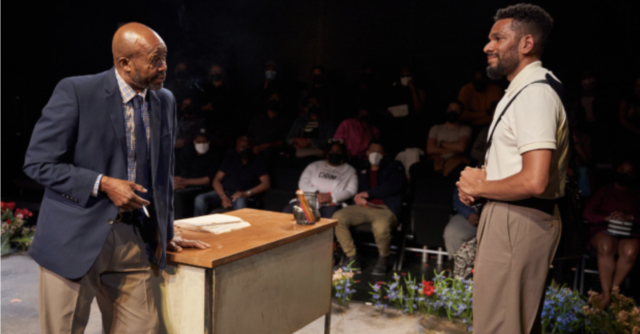
Mr. Cartwright (Leon Addison Brown) and Mr. Isaiah (Biko Eisen-Martin) have a difference of opinion in marvelous play at MCC (photo © Daniel J. Vasquez)
The play is beautifully directed by Whitney White (On Sugarland, Our Dear Dead Drug Lord), allowing each character to develop at their own pace and making room for Love’s poetic language to build organically; at times it is choreographed like a dance, with aggressive movement juxtaposed with tender moments. The cast is exceptional, from the six young students to the steadfast Eisen-Martin (In the Southern Breeze, Strange Courtesies) and the unshakable Addison Brown (“Master Harold” . . . and the boys, The Train Driver).
Adam Rigg’s set is a horizontal classroom, with the audience sitting in three rows of seats facing each other across the two long, open sides. This is the third play this year I’ve seen that takes place in an open-sided classroom, all exploring racial and ethnic identity and broken-down systems: Sanaz Toossi’s English deals with four Iranians learning English for various reasons, while Dave Harris’s Exception to the Rule is a Beckett-esque twist on The Breakfast Club as six Black teenagers are trapped in detention.
In soft, flowers separate the stage from the seats, as if a barrier of love, inspired by Kehinde Wiley’s series of paintings of young Black men stretched out on beds and couches, surrounded by colorful flowers on the wallpaper and sheets and floating through the air (Femme Piquée par un Serpent II, The Virgin Martyr St. Cecilia). Love writes in the script, “They stretch as far as the eyes can see. It’s all we see. We should get so lost in their beauty that we forget this is a play. Until . . . Flower petals start to fall from the sky.”
Cha See’s lighting allows everyone to see each other in the theater, which in a play such as soft is an added bonus, especially the night I went, when there was a clear divergence between the white and Black/brown audience members; the latter were vocal in response to numerous sharp lines and powerful situations, calling out in agreement — or disagreement — and snapping when a character made an important point. When I saw MJ on Broadway, I was not happy that the family sitting behind me was munching away on noisy potato chips and talking throughout the first act, but what was happening at soft felt so right, so natural. I also knew that I should not participate in the snapping and vocalizing, that it was definitely not my place. (The sound is by Germán Martínez, with original music by Mauricio Escamilla.)
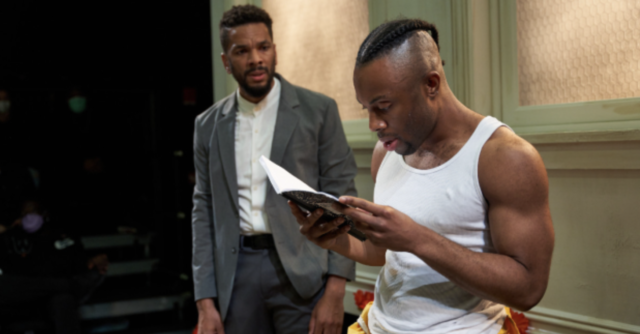
Mr. Isaiah (Biko Eisen-Martin) and Bashir (Travis Raeburn) don’t always see eye to eye in soft (photo © Daniel J. Vasquez)
That feeling was increased during a fourth-wall-breaking magic-realism coda in which the racial makeup of the audience was made central and magnified. It was only during the postshow talkback with White that I realized it was Black Theater Night; White pointed out that the coda is very different on other nights, when there are far fewer Black and brown people in the audience. The sense of exclusion of the white playgoers was made even more palpable when White explained that they should not speak during the discussion, should not ask a question or share their experience of the play. (The next Black and Brown Theater Night is June 17; the June 18 matinee will be followed by a mental health awareness conversation, and there will be a free Spoken Word Open Mic on June 18 at 5:30 addressing the question “What does softness mean to you?”)
It reminded me of an earlier work directed by White to which only Black and brown critics were invited because of the subject matter. It also brought me back to one of my most unforgettable nights at the theater, at the Flea in 2015, during the Bats’ participatory Take Care. Audience members were assigned varied actions, and I was given the task of telling all the Black and brown people in the audience to gather in a corner. You can only imagine how that went.
There’s a reckoning happening in theater, and it’s long overdue. I’m not about to complain about feeling excluded, given the shameful history of racial injustice and LGBTQIA+ discrimination in this country. I’m also not going to complain when the reparative work results in such marvelous and meaningful productions as soft, the title of which refers to the hope and joy, the basic humanity, that can be found even in hard times. Love, a queer Black Philadelphia native living and “thriving” with HIV, is a phenomenal playwright with his finger on the pulse of this transformation, as shown in such previous impressive works as one in two and Fireflies. I’m excited to see whatever Love and White do next, no matter how inclusive or exclusive it may be.
